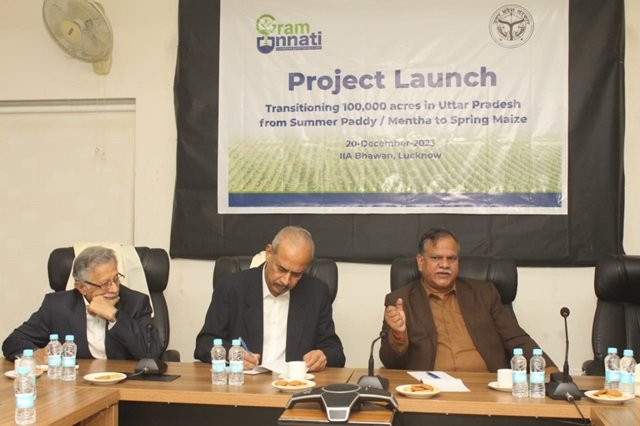Livestock Contract Farming can be successful in India with well-developed infrastructure
Narendra Pasuparthy, CEO & Founder, Nandu’s in exclusive conversation with AgroSpectrum shares his views on the current status of the meat sector in India.
Operating primarily in Bengaluru, Nandus operates nearly 50 stores in the city, adhering to an omnichannel model that encompasses in-store retail, home delivery, e-commerce website, app, call center orders, and various e-commerce platforms. In February 2023, Nandus reached the revenue milestone of Rs 100 crore, solidifying its position as India’s most successful and organised omnichannel meat retail brand. Poised to be a market leader in India’s growing meat retail industry, the company is set to expand its business-to-consumer (B2C) and D2C presence, further strengthening its operational foundation. Narendra Pasuparthy, Chief Farmer, CEO & Founder, Nandu’s in exclusive conversation with AgroSpectrum reveals the current status of the meat sector in India.
What is Nandu’s contribution to enhance the contract livestock farming sector in India?
A legislative framework governing agricultural agreements did not become effective until 2020, despite the fact that contract farming has been common in India for decades. This has cleared the way for more investments, the development of new markets, and improved financial stability for farmers in the cattle sector. We at Nandu’s think this teamwork strategy has great potential.
At Nandu’s, we’ve made it our mission to provide the farming community with a reliable means of subsistence ever since we opened our doors in 2016. At this time, 300 farmers are dedicated to working just with Nandu’s. Regardless of fluctuations in the market or other factors impacting production efficiency, our farmers are protected by integration farming contracts, which guarantee that they will not incur any risk.
The farmers contribute their work and infrastructure, and Nandu’s covers all the costs of chocks, chicken feed medications, and veterinarian support, so that the farmers’ community can be economically stable. It’s mutually beneficial. With proper implementation, contract farming has the potential to greatly increase productivity while safeguarding farmers’ interests.
Do you feel that contract farming will change the entire ecosystem of livestock farming in India by infusing more tech driven solution into this sector?
I believe that technology plays a significant role. Smart automation, improved inventory management, and data-based decision-making are three areas that have seen a technological explosion in recent years. Our capacity to offer full product traceability across the whole supply chain, from chicken rearing to final customer delivery, is a direct result of the technological advancements made possible by our farm-to-fork meat brand management.
But we don’t think tech-driven solutions will cause the ecosystem to undergo its most significant transformation. It everything comes down to people. An increasingly important part of India’s agricultural economy, the poultry business employs almost three million people.
Due to their lack of financial stability, many farmers experienced severe economic hardship and the loss of their livelihood during the epidemic. One way to offer such safety net is through contract farming. Despite the stress caused by the pandemic, our farmers report that their work is easier and more financially gratifying now. And that impacts every part of the ecology.
What are the major challenges livestock farmers face while enrolling in for contract farming?
The farmers’ biggest obstacle is getting over their aversion to collaborating with big corporations like Nandu’s. But we’ve found that farmers like it when you’re forthright and honest in your interactions with them, and when you truly care about what’s best for them.
A high mortality rate and low productivity are the results of working with low-quality chicks and feed, which most independent livestock farmers use. This puts their entire investment at danger. No matter how many hours a farmer puts in, this has an unpredictable effect on their yield, their profit, and their ability to provide for their families.
In addition to providing farmers with high-quality feed, chicks, and technical assistance for chicken growth, Nandu’s also offers intensive training in good farming practices, prompt veterinary services, and state-of-the-art technology to track flocks and outputs.
What inputs are required for the growth of contract livestock farming in India?
At Nandu’s, we take great care to partner with farmers that share our values and are committed to doing what’s right so that our business can thrive. We give them the technical and veterinary help they need in a timely manner and work closely with them. Our chicks are of such high quality that we spare the farmers any unnecessary stress, allowing them to focus on improving their operations and increasing their output. Thanks to our flocks’ exceptional performance, our farmers are able to increase their annual crop yield, which in turn boosts their income. Neither unreasonable requests nor hasty judgements have been made. In order to accomplish our common objectives, we collaborate. We do all of this on a regular basis so that the contract farming sector in India may have the feed it needs to expand.
Aside from this, looking at the bigger picture, this industry needs specific advancements in order to grow. Contract farming can only be successful with well-developed infrastructure, which includes transportation networks, cold storage, processing facilities, and farm facilities. Enhancing efficiency, decreasing post-harvest losses, and guaranteeing the quality and safety of animal products can be achieved through investments in infrastructure development. Farmers that engage in contract farming must have easy and affordable access to banking and credit services. Credit for inputs, working capital, and infrastructure investment are just a few examples of the unique financial products and services that banking institutions could create for contract farmers.
What are the growth strategies and plans of the company for FY 24-25?
The expansion of Nandu’s India’s network of contract farmers will be the primary emphasis of the company in order to further boost the inventory of livestock goods. The identification of new regions for contract farming partnerships, the recruitment of additional farmers into its network, and the provision of training and support to those farmers are all potential steps in this direction. Utilising new livestock products or value-added products, the company will investigate the possibility of diversifying its product line through the introduction of new items. Investing in technology and innovation will be a top priority for Nandu’s India in order to improve efficiency, improve product quality, and reduce costs. One example of this would be the implementation of digital solutions for farm management, the adoption of precision farming techniques, or the investment in research and development for new technology. The organisation is going to make efforts to optimise its supply chain in order to enhance its efficiency, decrease its expenses, and guarantee that products will be delivered on time. Streamlining logistics processes, making investments in cold chain infrastructure, and putting inventory management systems into place are all potential steps in this direction.
By Nitin Konde
Narendra Pasuparthy, CEO & Founder, Nandu's in



